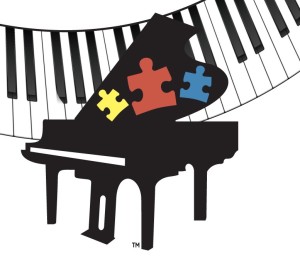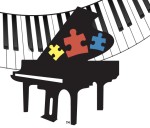Occupational Octaves: Do People With Autism…?
 Hi there again. It’s Lee welcoming you back for our next Occupational Octaves column! After a very, very long two-part introductory blog, it’s time for me to focus on my audience – you guys! Gail and I have had so many conversations highlighting the disconnect that people may feel when encountering piano students with special needs – whether diagnosed or not. The potential variety of issues is part of such a wide range, so I thought maybe answering a few questions might be in order. We’ll start with something Gail mentioned in one of our discussions. I’ll use that as a jumping off point to explain what I perceive, what I’d try, and why.
Hi there again. It’s Lee welcoming you back for our next Occupational Octaves column! After a very, very long two-part introductory blog, it’s time for me to focus on my audience – you guys! Gail and I have had so many conversations highlighting the disconnect that people may feel when encountering piano students with special needs – whether diagnosed or not. The potential variety of issues is part of such a wide range, so I thought maybe answering a few questions might be in order. We’ll start with something Gail mentioned in one of our discussions. I’ll use that as a jumping off point to explain what I perceive, what I’d try, and why.
IMPORTANT NOTE: No one can ever give reliable information on a special needs student without a personal interaction. These are only basic suggestions because a diagnosis like Autism, per se, has so many individuals under its umbrella that are completely different (various deficiencies, issues, complications, pathologies, personalities, etc.). If someone asks “do people with Autism _______,” that person has already missed the point. Each student is remarkably different and if you see two students doing the same exact thing, they may be doing so for two entirely different reasons. Before addressing these questions, I urge communication and education for yourselves if trying out a Special Needs Piano Lesson!
Gail: “I have had 2 students on the spectrum. One was actually very talented at piano and could learn and play very well but he was not very expressive. He learned from the score and could read like anything but was totally analytical about it. He played Beethoven Sonatas with precision and that only.”
On hearing this, I’d like to explain my immediate train of thought. The deficiency for this student is emotional and most likely social. If he is capable of reading sheet music with proficiency, then it seems that human connection is the best place you can help this individual. What I would do, in an attempt to teach him the ideas of expression through music, is explain an idea he can follow, like major and minor. He should be able to hear happy and sad in those sounds. If he can understand the difference, you may be able to show him that you have ways of making a sad part sound even sadder by playing it slow and drawn out or that you can make a happy part seem happier by playing it faster and staccato.
This is an easy example of looking to see what a student already understands and harnessing that information into teaching. Gail might be able to ask him what his favorite song is to play and, if she is able to identify his very favorite parts, see if they’re major or minor. This can potentially show that he is attracted to happy or sad music. I’ve had students dealing with severe depression that for numerous reasons react terribly to happy music and comfortably to sad sounds. I would assume that if you give the student who reacts comfortably to sad sounds the choice between playing major or minor songs, he’d choose the minor songs as negativity may be easier for him to connect with (and possibly play soulfully through.)
These ideas seem basic enough, but let me explain one of the countless situations in a special needs piano lesson where you can be fooled by what you see. Let’s say Gail tries this out and asks him what his favorite song to play is. With a student such as this, who may truly not have the emotional capacity or connections for this exercise, he may simply pick the song which he knows most proficiently. On the outset, it may seem that Gail asked him/her to pick his favorite song but he might not have. Be wary of that! If he picks the song he’s best at, try to get him/her to pick another one. You can also play a few songs and let him choose which one he likes to hear the most. Be sure to explain, in advance, that these aren’t songs for him to play and they’re only songs for him to listen to.
As with all advice from afar, I may be completely correct, I may be completely wrong! But this is my general thought process for this student. Questions? Comments? Compliments?!?! Also I’d like to issue an open invitation to e-mail me – Lee@OccupationalOctavesPiano.com – with a detailed situation you are dealing with and I will select the questions I feel I can best help with from afar. Please feel free to e-mail me and check out my program, Occupational Octaves Piano, all over social media!
Lee Stockner


